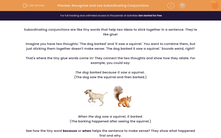Subordinating conjunctions are like tiny words that help two ideas to stick together in a sentence. They're like glue!
Imagine you have two thoughts: 'The dog barked' and 'It saw a squirrel.' You want to combine them, but just sticking them together doesn't make sense: 'The dog barked it saw a squirrel.' Sounds weird, right?
That's where the tiny glue words come in! They connect the two thoughts and show how they relate. For example, you could say:
The dog barked because it saw a squirrel.
(The dog saw the squirrel and then barked.)


When the dog saw a squirrel, it barked.
(The barking happened after seeing the squirrel.)
See how the tiny word because or when helps the sentence to make sense? They show what happened first and why.
There are lots of these tiny glue words, each showing a different relationship:
Although it was raining, we went outside.
(We went outside even though it was raining.)
If you finish your homework, you can play games.
(Playing games depends on finishing homework.)
The main subordinating conjunctions are:
If
Since
As
When
Although
While
After
Before
Until
Because
In this activity, we will be looking for the tiny glue words connecting the ideas! They help everything to fit together smoothly.









